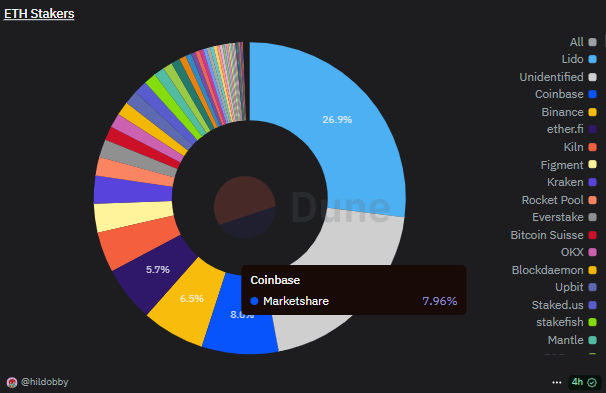Coinbase is one of the biggest holders of staked Ethereum (ETH), potentially signaling its ability to offer staking ETFs. The exchange controls up to 8% of staked ETH.
Coinbase is one of the biggest stakers of Ethereum (ETH), carrying up to 8% of the staked supply. The centralized exchange even surpassed Binance, which carries around 2.2M in staked ETH.

Coinbase is among the biggest proxies for staking, allowing retail investors to gain yield without locking 32 ETH.
Centralized exchanges work as hubs for more secure staking, while also gaining passive income. Coinbase currently offers up to 2.14% APY for using it as an intermediary. Currently, staking can bring back up to 3.95% in annualized earnings for those that deposit 32 ETH. Coinbase offers returns for smaller stakes, while handling the logistics of being a validator.
Coinbase has been proactive in securing some of the top chains, recently also becoming one of the fast Solana validators.
The exchange’s role for Ethereum may be linked to providing staking-based ETFs. The existing funds often resort to Coinbase Custody for holding their assets, and may extend to Coinbase’s staking service.
Staked ETH may revive ETF buying
One of the problems for ETH is the relatively weak demand for its available ETF. In the past couple of days, most of the top ETFs had a net outflow. The lowered demand follows selling pressures for ETH, as the price hovers in the $1,600 range.
A staking ETF may give incentives to new buyers, as they receive additional income on their investment. Staking has been proposed for other altcoin ETFs, including Solana and AVAX. However, ETH staking remains the most reliable source of regular rewards.
Coinbase also contributes by issuing Coinbase Staked ETH, cbETH, an asset that is also spreading to DeFi protocols. The ability to stake ETH, while receiving a new form of token may add an extra layer of potential earnings. The derivative asset, cbETH, also trades at a premium of $1,758.62, giving extra incentives for staking with Coinbase.
A staking ETF is currently in the pipeline, pending approval by the US Securities and Exchange Commission (SEC). There are expectations that a first approval can potentially arrive in seven weeks. The arrival of institutional staking also expects an Ethereum update, which would allow the staking of up to 2048 ETH in a single validator. One of the obstacles to staking scalability is the 32 ETH limit, leaving large-scale holders with multiple validators.
The US market still lacks a staking ETF, but European investors have access to products with passive income, provided by 21 Shares and Bitwise. An ETF can remove friction and the technical risks of staking, while also satisfying the demand for yield.
Currently, around 34M ETH are staked, expanding the number of validators. Buying an ETF would reduce the complexity of staking, while doing away with the 32 ETH requirement for retail buyers. Stakers split over 17,429 ETH from block rewards each week, while validators also gain a small share of gas fees. ETH retains a yearly inflation of 0.75%, offset by the staking yield.
